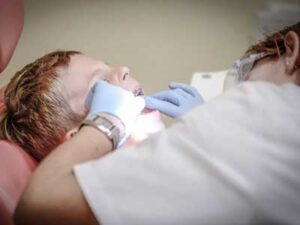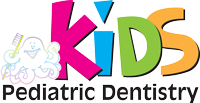Guidance of eruption and development of the primary and permanent teeth into a stable, functional, and esthetically acceptable bite with normal arch development is our goal. Both pediatric dentists and orthodontists work together to improve the oral health of their young patients. While pediatric dentists focus on the health of the teeth, gum, nerves, and jaw, we refer patients that need correcting of the bite (occlusion) and straightening of the teeth to orthodontists.
Growth and Development

Malocclusions
We can say with confidence that malocclusions (misaligned, mismatched, or incorrect relationship between teeth and/or jaws) have practically always existed in human history. In fact there is an estimate that about 30% of the population requires some sort of orthodontic treatment. Factors that create malocclusions include skeletal (jaw) problems, abnormal arch formation due to activities such as thumb sucking / mouth breathing / tongue thrusting, disproportionate size of teeth, misalignment of teeth and/or jaws, and missing or extra teeth.
The proper closing of the mouth in functions such as “biting” requires the coordination of many muscles, joints, teeth, and jaw bones. In a healthy bite, each tooth (with its cusps and grooves) matches nicely with its partner tooth in a relaxed way, simultaneously and with even pressure across the mouth, without additional friction (wear and tear). Problems with occlusions can range from simple jaw and tooth pain, to facial- and head-aches, to neck and back pain, breathing issues, and in extreme cases aesthetics of the face or even speech problems.
Not all malocclusions are the same, and hence they are classified depending on factors such as:
- how far the top teeth extend beyond the lower front teeth (overjet)
- the amount of overlap between top front and lower front teeth (overbite)
- relative position between the top and bottom first molars (jaw relationship or “class”)
- upper teeth meeting improperly with bottom teeth (cross bite)
- teeth leaving an opening when closing mouth (open bite)
A Class I malocclusion occurs when the jaws are in proper position, but the teeth are not aligned due to some of the factors above. A Class II malocclusion happens when the upper jaw is out and in front of the lower jaw and creates either a Division I bite (bucktooth appearance) or Division II bite (top front teeth cover the lower front teeth). A Class III malocclusion (underbite) occurs when the lower jaw extends beyond the upper jaw due to a combination of overdeveloped mandible and/or underdeveloped maxilla.
Types of Orthodontic Treatments in Allen
Depending on the malocclusion type, age of the child, and severity of it, there can be several types of orthodontic treatments:
- Normal oral/dental health procedures
- Night guard
- Enamel recontouring to remove interferences
- Restoration to close large spaces
- Sprint therapy
- Orthodontics (expansion of arches, many types of braces, extraction, appliances)
- Oral surgery to correct skeletal deformities
Between the ages of 2 and 3 years old, the pediatric dentists at KPD in Allen TX need to assess the bite relationship to determine the future malocclusion on the child’s bite. If needed the treatment period encompasses from 2-6 years of age (Stage I). Under this young age, we are concerned with underdeveloped dental archers, the premature loss of primary teeth, and harmful habits such as finger or thumb sucking. A treatment initiative in this stage of development is often very successful and many times, although not always, can decrease the time needed for orthodontic treatment.
Contact Kids Pediatric Dentistry Allen, to determine if your child needs orthodontic treatment in Allen.
For more information on orthodontics, please read Why You Should Get Orthodontic Treatment from the American Association of Orthodontists.
